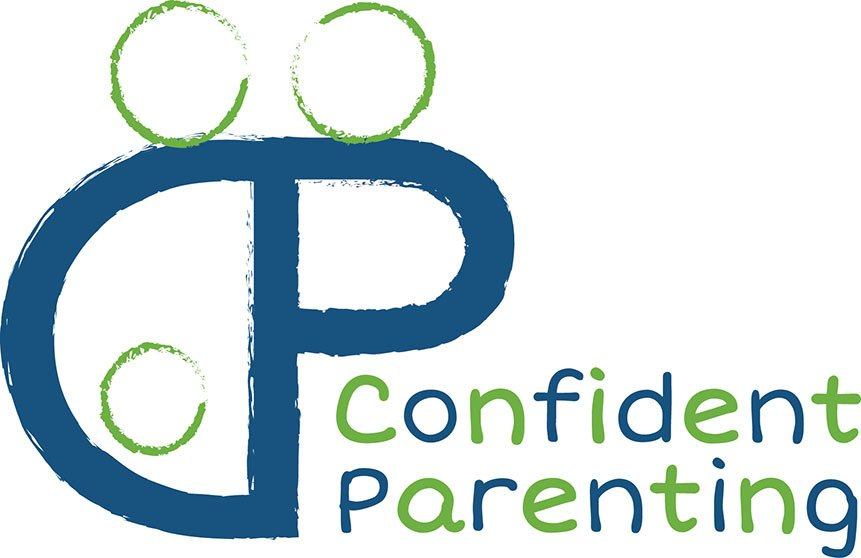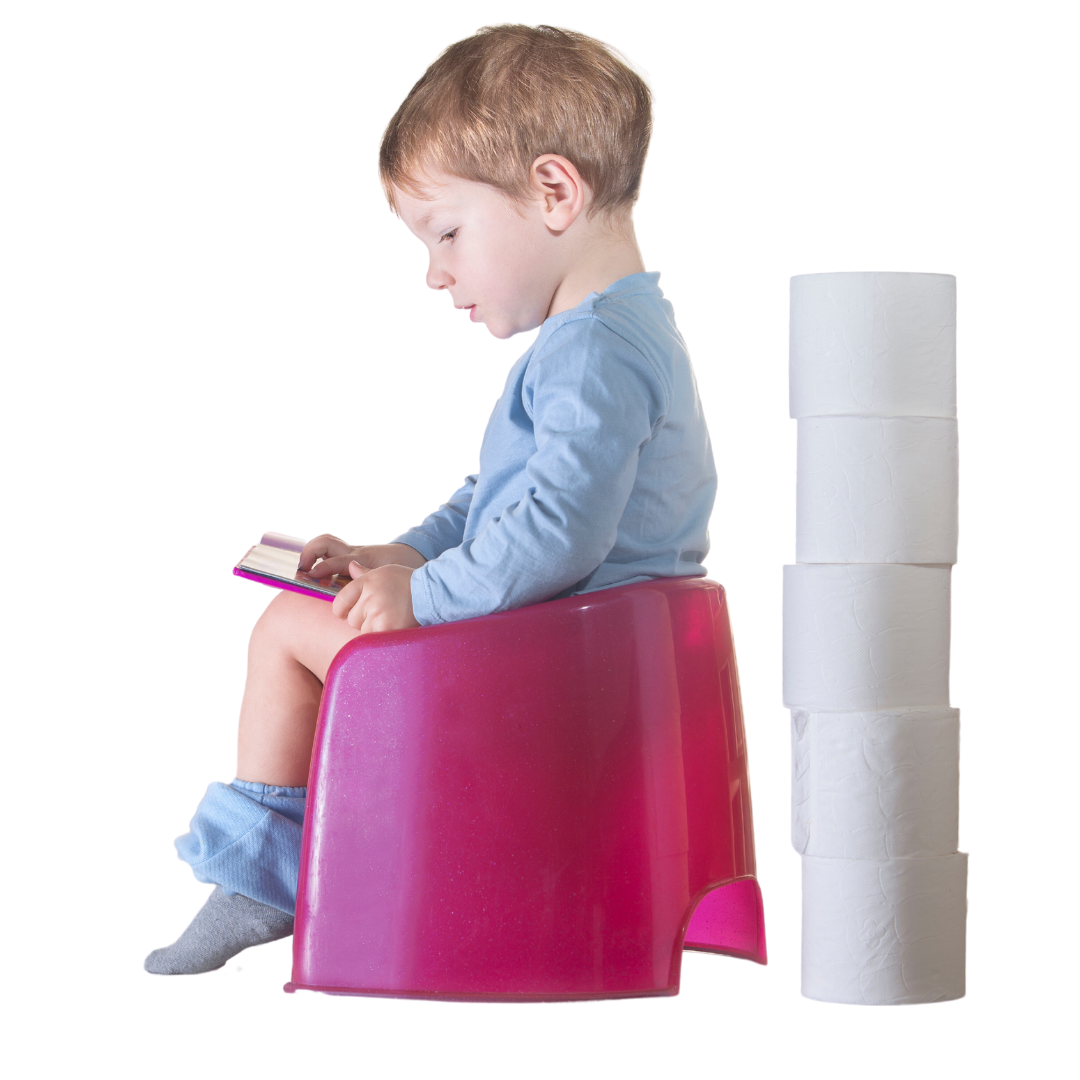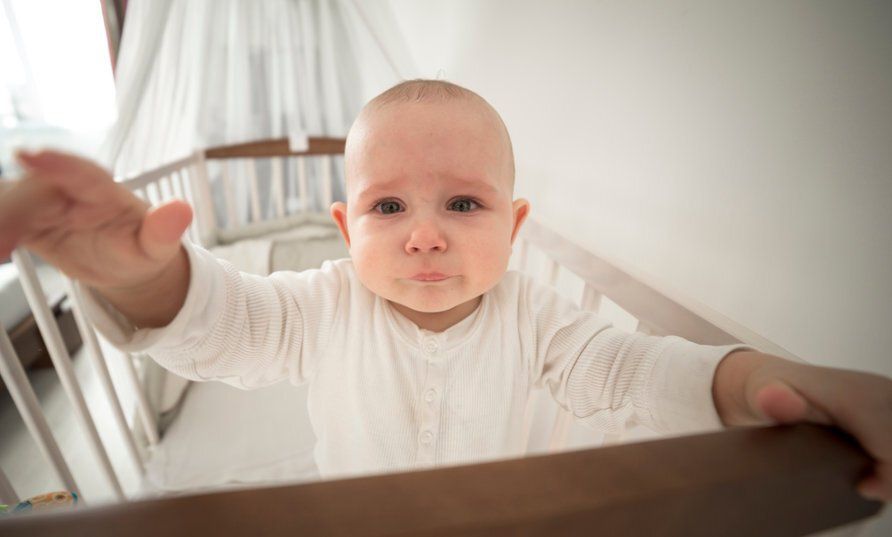Bernadette Samuels is an Oh Crap certified potty training coach and sleep consultant as well as mom to two young (recently potty trained!) children, Along with Amelia Kinsolving and Founder Erica Desper, they are moms supporting moms (and all parents) on the path to better sleep and smoother potty training, since 2010.
6 Steps to Salvaging (& Surviving) Sleep While Potty-Training
Bernadette Samuels
This major milestone, like any other, may threaten to wreak havoc on your child's sleep so here are our top six things to keep in mind and avoid...
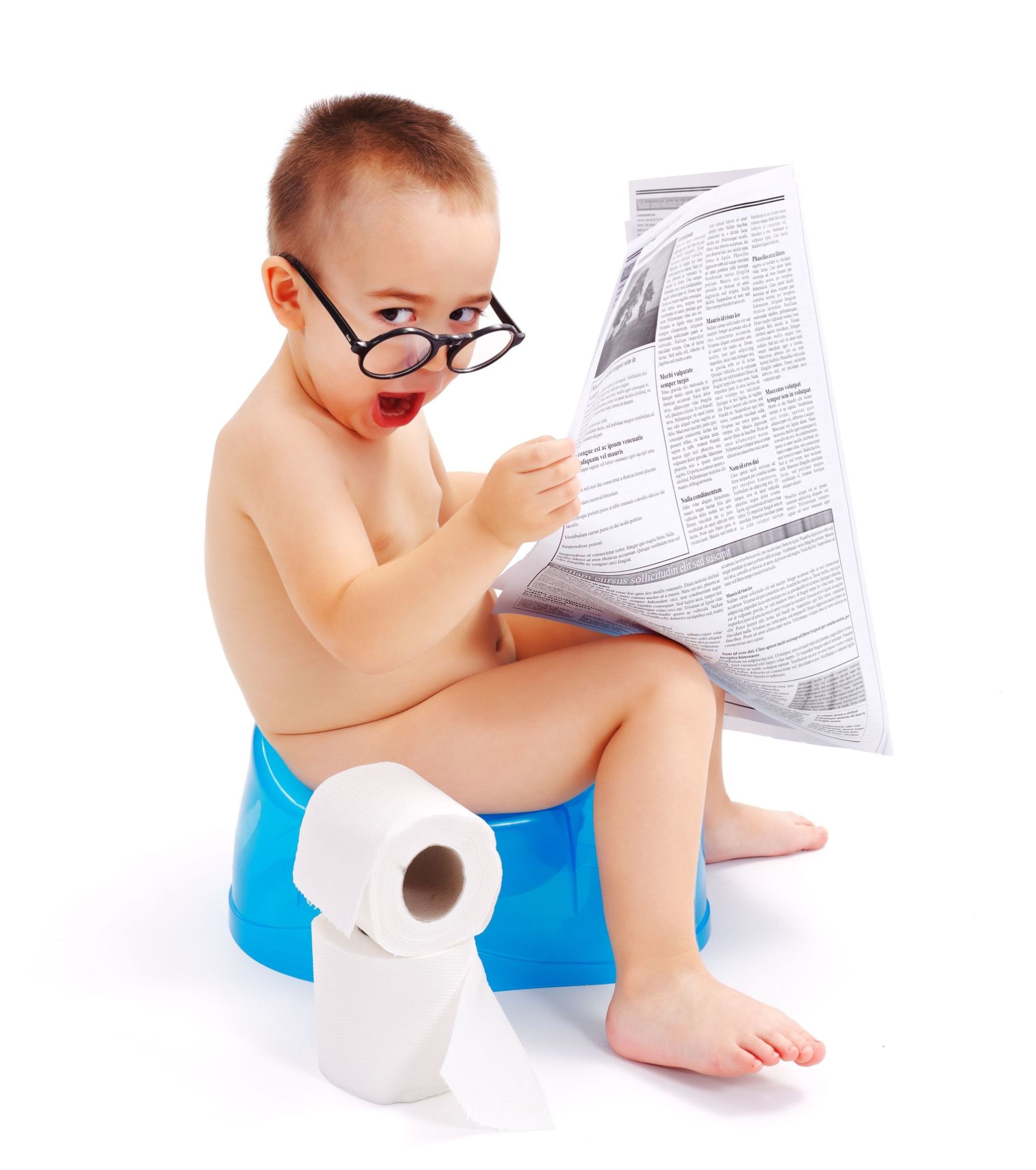
Is potty-training
threatening to disrupt your child’s sleep habits? Are they suddenly stalling at bedtime or waking overnight? Here are our team's top tips for maximizing sleep and maintaining your sanity while potty-training.
Learn More About Potty Training Support
Meet the Team
Start with a Discovery Call
Tip 1: Remember, Potty-Training is a Major Developmental Milestone
Did sleep take a hit when your child learned to roll, stand, walk or talk? As with any milestone, potty-training is likely to cause temporary disruptions in sleep, bowel and eating habits as well as in your child’s overall mood and behavior. While frustrating, disturbances or regressions in other areas are to be expected when the body and brain are taking a big leap in another area. This too, shall pass!
Bonus Pro Tip:
Stop waiting for parenting to get easy, lol. Instead realize that, for most of us, it will just get "different". Things that were easy may become hard but things that previously felt really tough will likely smooth out. Relish what is working for your family and don't sweat what isn't. Nothing lasts forever.
Tip 2: Tackle Daytime Training Only First
A child can be taught to recognize and act on the sensation of needing to go while awake. Doing the same when asleep though cannot be consciously taught, depends on many factors, and is often sometimes attained naturally and without an active training process along with or not long after daytime training has been mastered. Put them in a pull up for sleep and let them know it is okay to use the pull up at sleep times. You might say something like, "Sleep lasts a long time and your body might not wake up to go, so we will use this just for sleep." If you prefer to just address daytime learning first and wait to see where that takes you, go for it. Continue to use a diaper or pull-up for sleep, don't stress if/when your child uses it, and set an age or date to revisit nighttime progress or training.
Bonus Pro Tip:
If your child is 3.5 years or older and/or if daytime training is not progressing
and/or if they begin to hold all their pee or poo for that sleep diaper, it could be an obstacle for them and you may need to reevaluate sooner. Not all children can learn and progress with this new approach while the "old" approach is still in the picture.
Tip 3: Normal Sleep Patterns May Be Interrupted
Because this learning process involves your child beginning to recognize the sensations of being wet or soiled and then the sensations of needing to go, they may begin to wake overnight, during naps or too early in the morning. Ultimately this level of body awareness is what will get you both out of this training process, so try to see this mind-body connection and the disruptions it may cause as a good thing and proof that learning is happening. On a brain level, their brain is likely on overdrive trying to put this all together and that too can cause disrupted patterns, much like you might experience if you have a huge work project or presentation the following day.
Bonus Pro Tip:
Be ultra-cautious to avoid introducing new, or reviving old, habits if your child begins to wake overnight. Know in advance what you will and won't do and don't respond or help more than is needed. For example, if you can respond at their doorway and tell them it is still time to sleep rather than pulling them into your bed or climbing into theirs, sleep will bounce back far more quickly.
Tip 4: Limit Beverages Before Bed to Head Accidents off at the Pass
Give your child a better chance at staying dry overnight by avoiding or at least seriously limiting beverages in the 1.5 to 2 hours before bed. This will be more comfortable for you to enforce if focus on making sure they drink well throughout the day. Also, be sure to make a potty stop at the beginning of the bedtime routine and consider a "double pee" - adding one more potty stop in just before the final tuck and lights out.
Bonus Pro Tip:
To avoid creating a "fun" habit of leaving the room and stalling at bedtime, consider placing a potty in their room for that last stop and for easy access, if needed, in the middle of the night.
Tip 5: Set Limits and Strike a Balance
Many children quickly realize they can use this milestone as an opportunity to delay bedtime. Your child may ask to go over and over, and bedtime may start to slip later and later. To avoid this, set limits on bathroom trips and strike a balance between respecting their need/desire to go and prioritizing their sleep needs. Sleep is critical for their overall health and for a smooth potty process so loving limits are necessary to establish and enforce. For example, you could have a rule of “one more” at bedtime
and honor only that first bathroom request, but may need to say “enough is enough" after that… and stick to it. Tell your child that bathroom trips are all done or that “one-mores” are all done, and it’s time to sleep. And remind them that it’s okay to use their pull-up or diaper or, if there isn't one, the potty you have placed in their room. If you have a fluid cutoff and do the double pee and honor one "one-more" it is highly unlikely they will need to go again right then and there.
If your child wakes overnight asking to go you can use the same one-trip rule. Be sure to keep it boring! Walk them to the bathroom as silently as possible and march them back to bed. Do not redo the bedtime routine. Some children are ready to take themselves to the bathroom and back to bed overnight, and of course you can let your child know that is okay and encourage it. You can also create a potty station in their room: a potty atop a waterproof mat or pad
with a box of wipes beside it. Other parents find it helpful to wake their child to use the potty before they go to bed themselves. This can help avoid an accident or them waking you right after you've fallen asleep. Not all children can wake enough for this to be effective but it’s worth a shot if you’re willing to try it.
Bonus Pro Tip:
Don't try a wake to pee at or after 4am. The drive to sleep in this hours are so low that your child may really struggle to return to sleep quickly and easily or at all.
Tip 6: Prepare for Accidents
No matter how well you prepare, accidents are inevitable because they are part of the learning process. Once your child can stay dry all night even on some nights, take that as a cue that the time is right to ditch the overnight diaper or pull-up, if you haven't already or if you were waiting until an older age/stage. When you do, you may want to be proactive about preparing for accidents. Anticipating some middle of the night bedding changes, it might help to double up the crib or bedding layers. For example, place a waterproof mattress protector and sheet over another layer of the same. That way when you need to remake the bed overnight, you strip the first layer off and…voila… a fresh, dry bed is ready and waiting underneath!
Bonus Pro Tip:
Skip the bedding layers in favor of washable or disposable pads like Chux
and check out diaper skirts
or shorts for extra peace of mind. You can even toss a fleece blanket over a wet bed and lay your child right back on it, creating a barrier of dryness and dealing with the wet bedding in the morning.
Most of all, remember to breathe and pat yourself on the back every time you hold it together in the face of this challenge...and to give yourself grace when you don’t. If this s&*t were easy (pun totally intended), we'd be out of jobs!
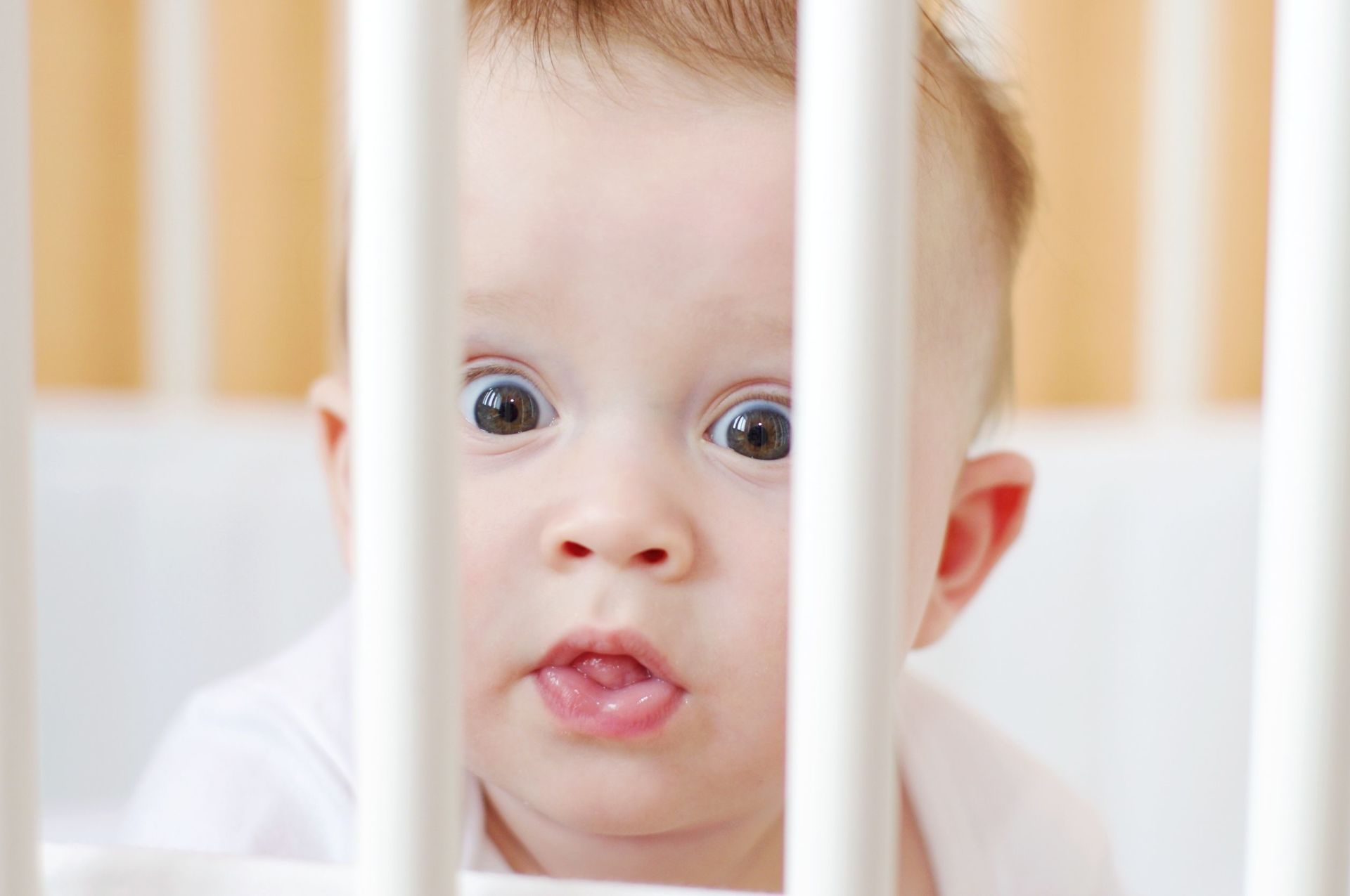
Every Fall we are swimming in calls and emails from exhausted parents whose baby or child is waking way too early every morning. So let’s talk about it! First, let’s make sure we’re talking about the same thing. Babies and children are programmed to be early to bed and early to rise so, typically, waking at 6 or later is considered normal. We define early rising as regularly waking before 6 am, before an adequate total of sleep, or at a time that is unusually early compared to your child’s normal wake time. So what causes a child to gradually or suddenly begin waking too early? Bedtime is Too Late or Too Far Out From the End of Nap The most common cause is too late of a bedtime or, similarly, too long of a wakeful period from the end of nap to bedtime. Our little ones have an internal clock that tells them when to feel sleepy and when to wake up as well as how long they can comfortably manage being awake. Going to bed after their ideal time actually causes them to pop awake earlier the next morning. As counterintuitive as it may seem, going to bed even a tad too late or too tired often results in less sleep rather than more. Many parents fall into this trap in the spring and summer months as it stays light out later and we are extra busy with traveling and socializing. Your child’s clock and sleep needs, however, do not shift later with the daylight so this can cause a delayed reaction that surfaces in the Fall. So, if bedtime has recently shifted in your home or naps have been hit or miss that is the likely culprit for the early wake up call. Take a close look at your recent family schedule and aim as often as possible to shift back or at least closer to the schedule that was in place when all was well with sleep. The Room is Too Bright The level of light in your child’s room can interfere with sleep year round but especially during those seasonally extra-long days. Daylight has a big impact on sleep as the reduction of daylight in the evening causes our bodies to release the sleep helping hormone, Melatonin and the rising of the sun signals our brain to wake up. So if the summer sunlight is streaming into your child’s room at bedtime and the crack of dawn the next morning sleep struggles may ensue. Blackout curtains can be a lifesaver or, in a pinch, thick black trash bags and tape around the window frames. For some very sensitive children even the light that streams in the sides of the curtains is enough to trigger a wake up. For these little ones wrap around curtain rods may be necessary or a product like the ones available at BlackoutEZ.com or SleepoutCurtains.com . If you are traveling or have windows that are too large to cover, consider the SlumberPod . Developmental Leaps If your little one is approaching or mastering a new cognitive or motor skill this leap can cause temporary early rising. For example if they are learning to roll, crawl, about to take their first steps or acquiring new vocabulary very quickly their brain and body may be so revved up that they pop awake bright and early wanting to practice. Naps often suffer during leaps too which can compound the problem. Your best bet during a leap is to try to keep your child as rested as possible until normal sleep patterns resume. If they have a back-up sleep method such as the car or stroller use that to your advantage to tank them up on sleep. If not, a temporary earlier bedtime can help offset the early rising, not by solving it but by keeping sleep totals high until the leap passes and a normal wake time and bedtime can resume. Early Wake Time is Being Reinforced Whatever the cause of your child’s early rising you’ll want to be cautious to avoid reinforcing it as the new time to start the day. While it is much easier to just let them get up whenever they wake, that will reinforce this as the new wake time making it much harder to correct. Instead, aim to have a set time when it is okay to start the day (you can use 6 am or after 11 hours of sleep or whatever was normal for your child) and treat anything before that time as you would a middle of the night waking. That may mean responding with a quick check in, helping back to sleep or ignoring depending on what you are comfortable with. The goal would be to persist with that response either until your child returns to sleep or until the clock strikes the set time at which point you can get them up to start the day. While it will feel frustrating to leave your child in their room and not have them return to sleep, it will accomplish the goal of not reinforcing the early waking time which can pave the way for correcting the habit. For children 18 months and older you can consider introducing a toddler clock such as the Gro, OK to Wake, or Hatch clocks. These can help a child to understand when it is and isn’t time to get up (without relying on sunlight) and make your responses seem much less arbitrary. Falling Back on the Clock The end of daylight saving can easily rock your child's sleep timing and totals. Overnight we decide that baby's usual wake time is now "too early". It stinks for everyone and it isn't your child's fault. You can read our tips on shifting before or after the clocks change below. The goal is to prevent a domino effect of overtiredness and/or getting stuck on schedule that starts and ends too early, so you'll want to make sure you are helping them shift back to more reasonable times/your goal times a little bit each day. How to Survive Falling Back on the Clock These are just a few of the reasons mornings may creep or have crept earlier for your family. Whatever the cause, you can take steps to reclaim your mornings! And if you can’t sort out the cause or solution on your own, our sleep team is ready to help.
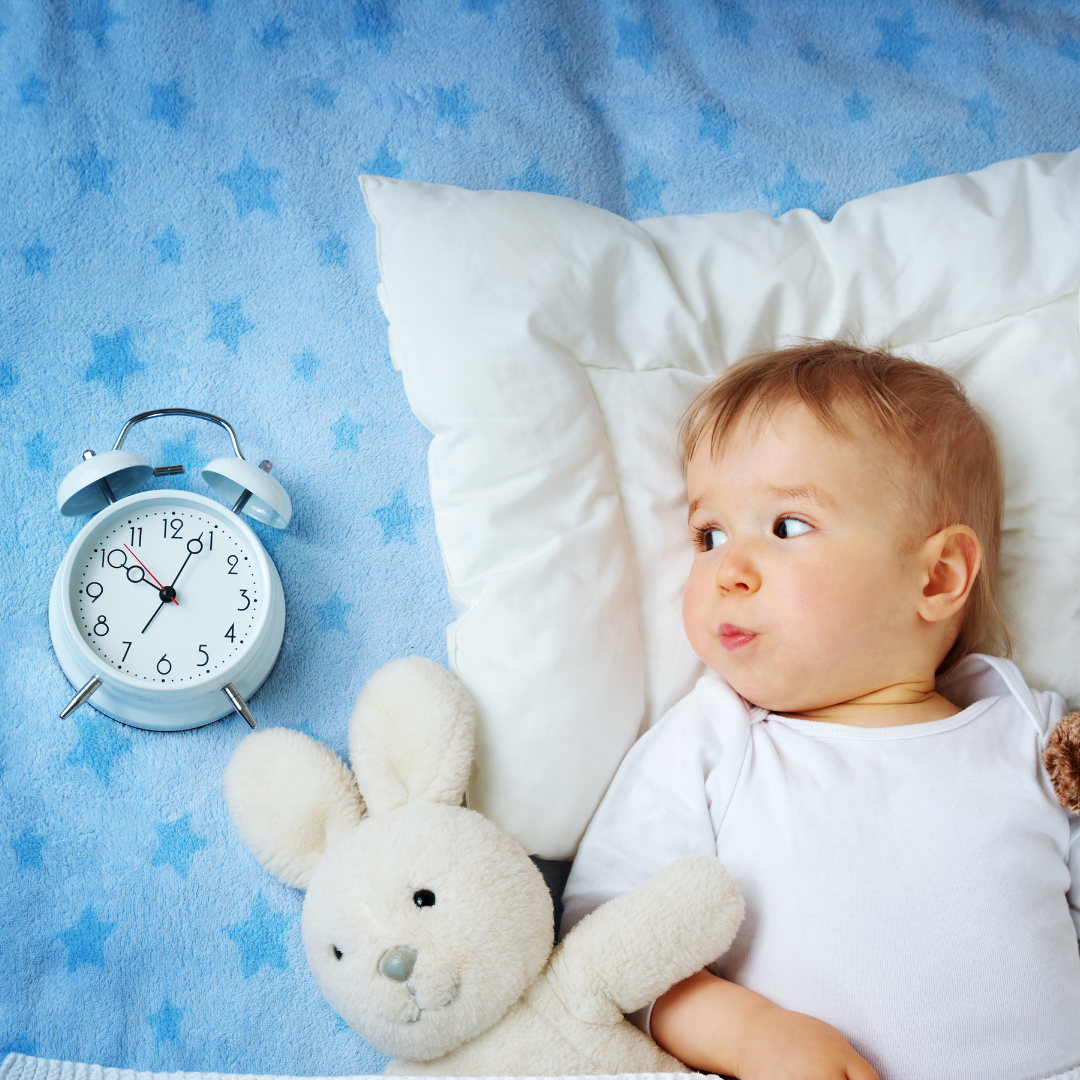
The time change is swiftly approaching and parents are beginning to panic! I don’t blame you. If you have a sensitive little one like I do, the time change can wreak havoc on the family’s sleep for a long time. Bedtime will feel a full hour later to your child and a 6am wake-up call abruptly becomes a 5 am one! Here are some tips to help your family prepare for the change and transition more smoothly... Before the Change: O ption #1 – Do Nothing! If you have a child who is rather adaptable and well rested and who is waking at a reasonable time each morning you may be able to go with option #1 and do nothing in preparation for the change. When your family wakes that morning simply shift the day’s schedule and activities to the new clock times and roll with it. Your child may be a little overtired and feel free to offer naps and bedtime slightly earlier if needed but your child should adjust within a few days. They may continue to wake "too early" on future mornings though and you'll need a plan for that so be sure to keep reading, just in case. Before the Change: Option #2 – Shift the Schedule in Advance If you have a more sensitive child, one who is already overtired or waking too early in the morning (before 6 a.m.), you may want to consider shifting their schedule in advance of the change. Remember that sleep times on Sunday will feel a full hour later to your child and, for a sensitive child, can wreak havoc on sleep and their mood. For these kiddos consider approaching the transition gradually by spreading the time shift out over four nights rather than one. You can do this by shifting wake time, meals, naps and bedtime 15 minutes later each day. For example, if bedtime is 7:00 p.m., you could begin on Thursday night by shifting that to 7:15 p.m., then 7:30 on Friday night and 7:45 on Saturday night. By Sunday night bedtime would be 8:00 p.m. which will again be 7:00 on the new clock. For highly sensitive children you can slow that process down even more, shifting the schedule by just 5-10 minutes at a time and/or every 2-3 nights and starting farther in advance. After the Change: Option #3 – Split the Difference/Shift After the Fact If you are/were unable to shift the schedule in advance or, if you plan to do nothing but your child struggles with that, you can split the difference. To split the difference shift your child’s schedule earlier by 30 minutes the day the clocks change and another 30 minutes earlier the following day. For example, if nap usually falls at 9 am and you put baby down at 9 am on the new clock that will feel like 10 am to them, a full 60 minutes later than usual. To avoid too much overtiredness you can split the difference, putting baby down at 8:30am on the new clock so they feel only 30 minutes overtired. Then, the following day, shift another 30 minutes back to napping at their usual time of 9 am on the new clock. Of course you can do this same shift in smaller increments after the fact as well, taking more than 2 days to match up to the new clock times. When in doubt, ask yourself, "What time does it feel like to my child?" Then decide how you can adjust to nudge them past that and closer to the time we now want it to feel like. Many children will adjust in a few days but the most sensitive and least adaptable ones can take a couple of weeks to fully adjust... * Don' t Get Stuck! Y our goal is to shift sleep back to your child's typical sleep times but on the new clock rather than allow their schedule to shift a full hour earlier and get stuck there. * Keep it Dark & Boring Regardless of how early your child wakes, b e sure to keep them in their crib/bed/room until their normal wake time. During the process your child will likely wake earlier than usual (according to the clock but not according to your child!) for a time. Do not get them up or allow them to get up before the new desired time. Avoid exposing them to lights, screens, and activity before the desired goal time. Over time that will help to reset their internal clock and get their wake time back on track. * Reprogram Their Toddler Clock If you are using a toddler wake-up clock be sure to reprogram it to wake at the new goal wake time. Have them remain in their crib/bed/room until the clock wakes up. * Get Outside! Since our internal clocks are set by daylight, aim to go outside in bright sunlight for 20-30 minutes each morning after the change. This too will help to reset your child’s internal clock and get things back on track more quickly. As with all things parenting, remember, this too shall pass! If you need support to navigate the time change, early rising or another sleep challenge, learn more about how we can help.

Thank you to Baby Merlin's Magic Sleep Suit for sharing this guest post! Do you have a toddler who is still waking for milk overnight or very early in the morning? Well, you are certainly not alone We've worked with countless families who are struggling with frequent or early morning wake up calls for milk from their toddler or preschooler. Here are five steps you can take to support your sweet little milk monster while still reclaiming sleep for yourself and the family. Step #1: Ditch the Bedtime Milk Habit In most cases, an overnight/early morning milk habit (beyond the baby stage when it may be calorically necessary) can be traced to a bedtime milk habit. If your child falls asleep while drinking milk or even if milk is an integral element of the bedtime routine in their mind, this creates a pattern that your child will want repeated when they wake between sleep cycles (which we all do throughout the night and more often in the early morning hours.) Your goal is to establish a different pattern and one that doesn't have milk in it. Offering milk ahead of beginning the bedtime routine and outside of the room your child will be sleeping in is often the first key to eliminating the need for more milk overnight. Try offering milk with dinner and even after dinner but make it a mealtime, daytime/playtime activity rather than a component of the routine leading up to sleep. Step #2: Put the Milk to “Night-Night” We know, we know – your toddler will lose their mind when you take that first step. To ease the transition, try our trick of making a big to-do of putting the milk to “night-night” right before you head upstairs for the bedtime routine. Walk with your child to the refrigerator and place the cup or bottle of milk in there together. Then blow kisses to the milk and say, “Night-night milk. See you in the morning!” If you’re trying to curb a nursing habit, the same trick can apply. Nurse outside of their bedroom and make a big to do of saying goodnight to “the girls” before heading into their room. If needed, add other elements to the bedtime routine that takes place in their room to replace the step of milk. For example, read books, snuggle while singing songs, and/or walk around to say good night to items in the room. If your child asks or cries for milk, remind them that milk is sleeping, and we need to sleep too. Incorporating the book Nursies When the Sun Shines or one that is similar can help your toddler begin to grasp that milk won't happen at sleep times anymore. If your child relies on a cup or bottle, you can just change the language to "milkies" or whatever resonates. Step #3: Choose & Implement a Consistent Non-Milk Response At the end of that new, milk-free bedtime routine, place your child fully awake into their crib (note- helping them to drowsy is not likely to help your cause) and decide if and how you will respond and/or support them through any upset they need to express over this change. For example, you might sit or lie beside their crib/bed and hold their hand or rub their back until they fall asleep, weaning off that over time. Or you might pop back into the room at designated intervals to comfort them briefly, weaning the checks over time. Once you choose your bedtime response, be sure to repeat that same response every time they wake overnight and/or too early each morning. The key to getting your toddler to accept this change happily is to be ultra-consistent from bedtime to wake time. More on that in tip #5. Step #4: Offer Morning Milk Outside the Bedroom Once you make it through the night another key is to offer your toddler’s morning milk outside of their room as well. Remember, you are aiming to send a consistent message that milk doesn’t happen in the bedroom anymore and that milk is no longer attached to sleep. It may be difficult for your black and white thinker to understand why they can have milk in the room as soon as they wake in the morning, but not when they wake at other times. Think like a toddler and move ALL milk out of the room for the smoothest results with the least possible amount of drama. Step #5: Consider a Toddler Clock The final step? Consider giving your toddler a tool to understand when it is and is not time to get up and time to have milk. It may seem arbitrary to them why they can’t get up and have milk at 4am but they can at 6am. And, in a well blacked-out room, those times can all look and feel the same to a child who can't glance at a clock. A toddler clock solves that by using pictures or colors to signal when it is time to return to sleep and when it is time to get up and go. With time and reinforcement, children 18 months and older can begin to grasp the concept. You might, for example choose a clock that displays an animal who is either asleep or awake and program it to "wake up" at or after 6am. Or a sun that goes to sleep at bedtime and wakes up in the morning. Then, when your child wakes overnight or too early in the morning and asks for milk, you can reply, “Bunny/the sun is sleeping. Milk is sleeping. You need to sleep too” and implement your non-milk response. And, when they wake in the morning, “Yay! Bunny/the sun is awake! Now we can wake up.” Popular clocks include the Kidsleep, Gro , Ok to Wake , and Hatch. There are many options but simpler is better, especially for young toddlers. With these five tips in place, your milk monster will begin to fall asleep without relying on that crutch and pattern and thus become willing and able to return to sleep without it too. If you need support to tackle bedtime battles, night waking, early rising or any other sleep challenge, our team is here to help! Originally Published on Baby Merlin's Magic Sleepsuit
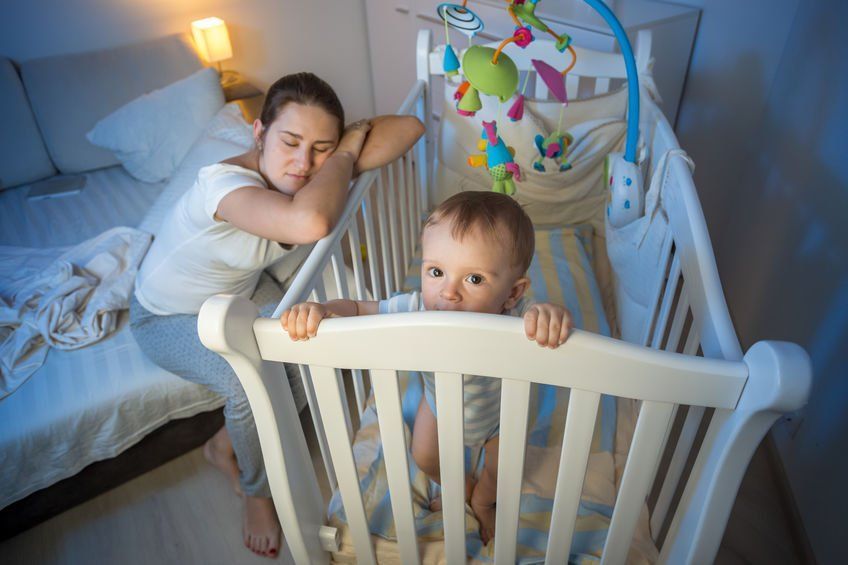
Being a new parent is one of the greatest joys you can experience – but the sleep deprivation that often accompanies it can be one of the greatest challenges. When you’re exhausted, it’s difficult to be your best. The key to a good night’s sleep is having the right tools and the proper guidance to get into – and maintain – a healthy routine. Erica Desper, Certified Baby and Child Sleep Coach, shares her thoughts on night waking and the “speed bumps” that sabotage sleep. Up all night with your little one? Join the club. One of the most common complaints of new parents is sleep deprivation, especially when it extends beyond the newborn period. Many parents experience an initial period of sleep deprivation followed by a blissful one where baby’s sleep settles into a more predictable pattern of waking only once or twice to eat. Then, as if someone flipped a switch, frequent waking resumes as often as every 2 hours overnight and every 20-45 minutes into each nap, often around the 4 month mark. (Have you heard of the dreaded four month sleep regression? Well you have now!) What’s up with that and what can you do about it? The “secret” to solving night waking is to understand that we all wake frequently throughout the night. When we transition between sleep cycles, we experience a partial arousal where we wake very briefly before shifting into the next cycle, very much like rolling over a speed bump while driving. During this partial arousal we are prone to notice if anything is missing from or has changed in our environment. For example, if your pillow fell on the floor, you would likely notice, wake fully, and replace it before returning to sleep. Babies and children hit these normal transitions too and, from about 12-16 weeks of age on, hit them more often. These sleep “speed bumps” are integral to the structure of sleep and we can’t remove them. The goal with resolving night waking is not to prevent these arousals, but to ensure your child is willing and equipped to move through them and into the next sleep cycle on their own. That is the difference between a child who is sleeping through the night and one who is waking frequently. One can manage the transitions, treating them like speed bumps whereas another cannot and wakes fully, treating these transitions like stop signs. Imagine you fell asleep in your bed with your partner and pillow and, 2 hours later, awoke alone on the kitchen floor. You would likely be a bit disoriented and alarmed but, more importantly, would you be willing and able to go back to sleep on the kitchen floor? Or would you march back to your cozy, familiar sleep scenario in your room and bed? Very likely the latter would be more realistic. Now picture that scenario from your baby’s point of view. Often it involves falling asleep in arms – sometimes with milk – and then being transferred into the crib, asleep or very drowsy. Then, about 2 hours later (or 20-45 minutes later in the case of a nap), your child hits a partial arousal, notices that all those things are missing, and wants/needs you to recreate that scenario to get back to sleep. The goal of sleep learning is to work toward helping a child learn to fall asleep independently and in the same space and environment they will wake in later in the night. You want your child to hit that transition, look around and say, “Oh, nothing is missing. Nothing has changed. And I know how to get into the next sleep cycle.” So really there is no secret – it’s a process of learning how to fall to sleep and back to sleep independently. And, fortunately, there are options for parents in terms of how you choose to support your child through that process. Check out our recent series on sleep training/learning including: * Do I Need to Sleep Train My Baby? * 5 Things to Do Before Diving into Sleep Training *Does Changing Sleep Habits Mean my Baby Has to Cry? * Which Sleep Training Method is Best? 3 Ways to Decide * 4 Reasons Sleep Training Isn't Working Want to tackle sleep learning together? Learn more about support and schedule your discovery call below. Originally Posted on Center City Pediatrics
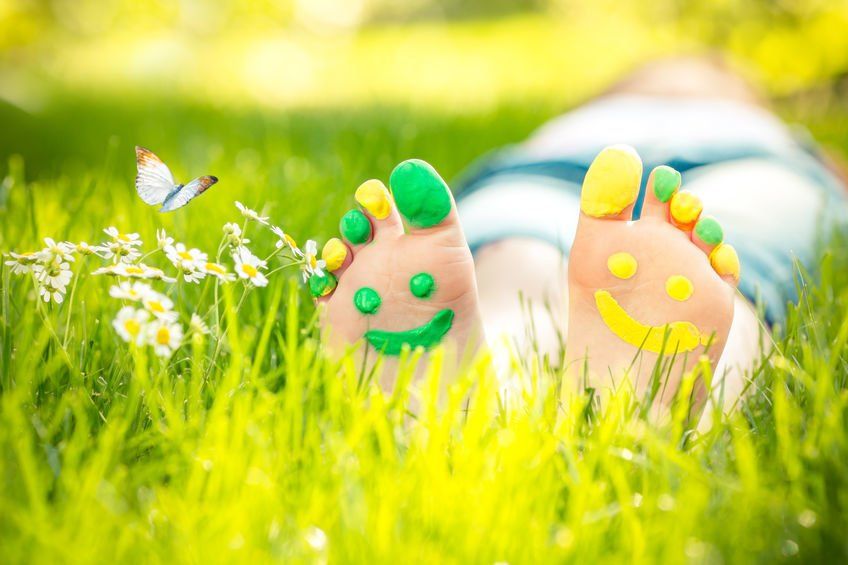
We have made it through Memorial day weekend which means that Summer is quickly approaching! Along with the sunshine and excitement though come several challenges that can impact your child’s sleep habits. If you give some thought to them now, you won’t be calling us in September lamenting that sleep is a mess. #1: Shifting Bedtime Later With the Sun It is a wonderful thing when the days lengthen and it stays light out later. Suddenly I don’t feel ready for bed at 5:00 p.m. The drawback is that your child may not feel quite as sleepy at their usual bedtime either and your older child is very likely to complain that “it isn’t even dark yet!” Many parents let bedtime slide later as the days grow longer and, while it may seem fine at first, the accumulation of over tiredness that results often rears its ugly head weeks or months later. We get many parents coming to us in the Fall with seemingly inexplicable bedtime struggles and night waking which we eventually trace back to this cause. Keep in mind that your baby or child has an internal clock that tells them when to feel sleepy at night and when to wake in the morning. That clock does not shift seasonally with the sun so, if bedtime does, repercussions from too little sleep and resulting overtiredness are likely. So how can you keep bedtime happening on time? Try “putting the house to sleep” by dimming the lights and activity in the house about 30-60 minutes before the bedtime routine. Draw the curtains in the main area of the home and slow things down to help your child begin to wind down. Or, head into the bedroom early so your child can wind down longer in that darker space. If the bedroom isn’t dark, invest in quality blackout curt ains so you can make it so. You don’t want your child to feel as if the whole world is still enjoying the day out there while they are trying to fall asleep. If neighborhood noise is a factor, consider adding some background white noise or music to mask it. #2: Getting up With the Sun Each Morning Daylight signals the brain to wake up. So, if sunlight begins to stream into your child’s bedroom earlier and earlier, their wake time may creep earlier as well. That can easily turn into a 5:30am wake up call. Combine this earlier wake time with the later bedtime and you’ll soon have a perfect storm of sleep struggles. Help your little one get their necessary zzzz’s by investing in quality blackout curtains that block morning sunlight. You want them waking when their internal clock tells them to wake and because they have had enough total sleep- not because early sunlight is waking them. In a pinch, try taping some thick black trash bags to the window frame behind your existing window treatments. Many parents tell their child, “We sleep until the sun comes up.” Obviously that can backfire when the sun comes up too early. For children 2 or older adding a toddler clock can help them understand when it is and isn’t time to get up without relying on the sun. One popular clock, the LittleHippo, has a face that is either asleep or awake. You can then tell your child, “We sleep/stay in bed until the clock wakes up” or, “The clock is still sleeping so you need to sleep too.” This clock also can change from red to green so you language can be "The clock is red for stop and stay in bed" or "The clock is green for get up and go." Over time and with reinforcement and consistency, children can learn to either return to sleep or lay/play quietly until the clock wakes up. The Hatch , Ok to Wake , Gro and Big Red Rooster clocks are also popular options. #3: Bringing Travel Habits Home One of the best things about the season is of course vacation. Traveling however can wreak havoc on your child’s sleep due to schedules and sleeping arrangements that are off from the norm. It is very easy for vacation habits to carry over once you return home and to then be stuck with those habits. For that reason I suggest that as soon as you set foot through your front door you return to the home “rules” in terms of where and how you put your child to bed. For example, if you had to room or bed share out of necessity while away, go right back to putting your child down in their own sleep space as soon as you get back. If you were holding them to sleep for fear of disturbing other family or guests, go back to putting them down awake. Yes, they may protest for a night or two, but children are very smart and, as long as you are consistent, they will adjust. Children can understand that one thing happens while away and another at home just as they can grasp that Mommy does things in a totally different way than Grandma! Getting right back on track will help everyone adjust more quickly and prevent having to relearn sleep habits or skills. Taking these measures to protect your child’s sleep will help your family get the most out of the season. If you need support getting sleep on a better track or back on that track, our team is here to help. Happy Summer everyone! ** As an Amazon Affiliate I earn from qualifying purchases **

Welcome and congratulations on embarking on your support journey! We know it can be very overwhelming to “shop around” to find your best fit so here are some things to consider that set us apart. Our Training & Experience Confident Parenting was "born" in 2011 and our sleep and potty team has 24 years combined experience doing what we do. Our founder, Erica Desper , was trained and mentored by The Sleep Lady, Kim West as a Gentle Sleep Coach and the entire team was trained, certified and continue to be mentored by The Poop Lady herself, Jamie Glowacki, author of Oh Crap! Potty Training. We are each Certified Lactation Counselors, and participate in continuing education including courses in infant mental health & development, postpartum mental health and much more. Since 2015 we've been the sleep specialists for Center City Pediatrics . Our Medical Collaborations Our sleep package includes a 60-minute medical screening with a triple-board certified sleep medicine physician/pediatrician/pulmonologist and our 4-week potty-training package includes a 30 minute screening with an Occupational Therapist with experience in toileting challenges to determine whether any underlying issues could interfere with progress and may need to be explored. This helps the families we work with avoid lengthy periods of training with little to no progress due to hidden underlying issues. Our “Guarantee” & Payment Plan Option While we can never guarantee what any child can do or what any parent can be consistent with, we CAN guarantee that we will stick with you along the way. Our 4 week package includes a “guarantee” that if you haven’t achieved your goals within that timeline, we will stay in touch for an additional four weeks, at no additional cost to you. This allows you to stress less, breathe more easily about investing in support and focus on reaching your goals rather than on a clock ticking over your head. We also offer a payment plan, so you can spread your support purchase out across 4 payments. Our Accolades We are honored to have been named "Best" and "Family Favorite" resource by the Main Line Parent and Philadelphia Family communities over 12 times since the inception of their annual LOVE awards. In addition, there are our 5 star reviews on Google , Facebook , & Yelp plus all these testimonials from the parents we've supported. Our Comprehensive Network Life and parenting don’t happen in a bubble so, when families tackle sleep & potty-training, they often have the bandwidth to realize they need support in many other areas of day-to-day family life. That’s why we’ve made it our mission to connect with the best of the best resources in and around the Greater Philadelphia area, many of whom offer virtual support for families anywhere, and have collected them together on a directory , to make your life easier. It truly takes a village and we are happy to have helped countless families find theirs. We look forward to supporting you and yours!
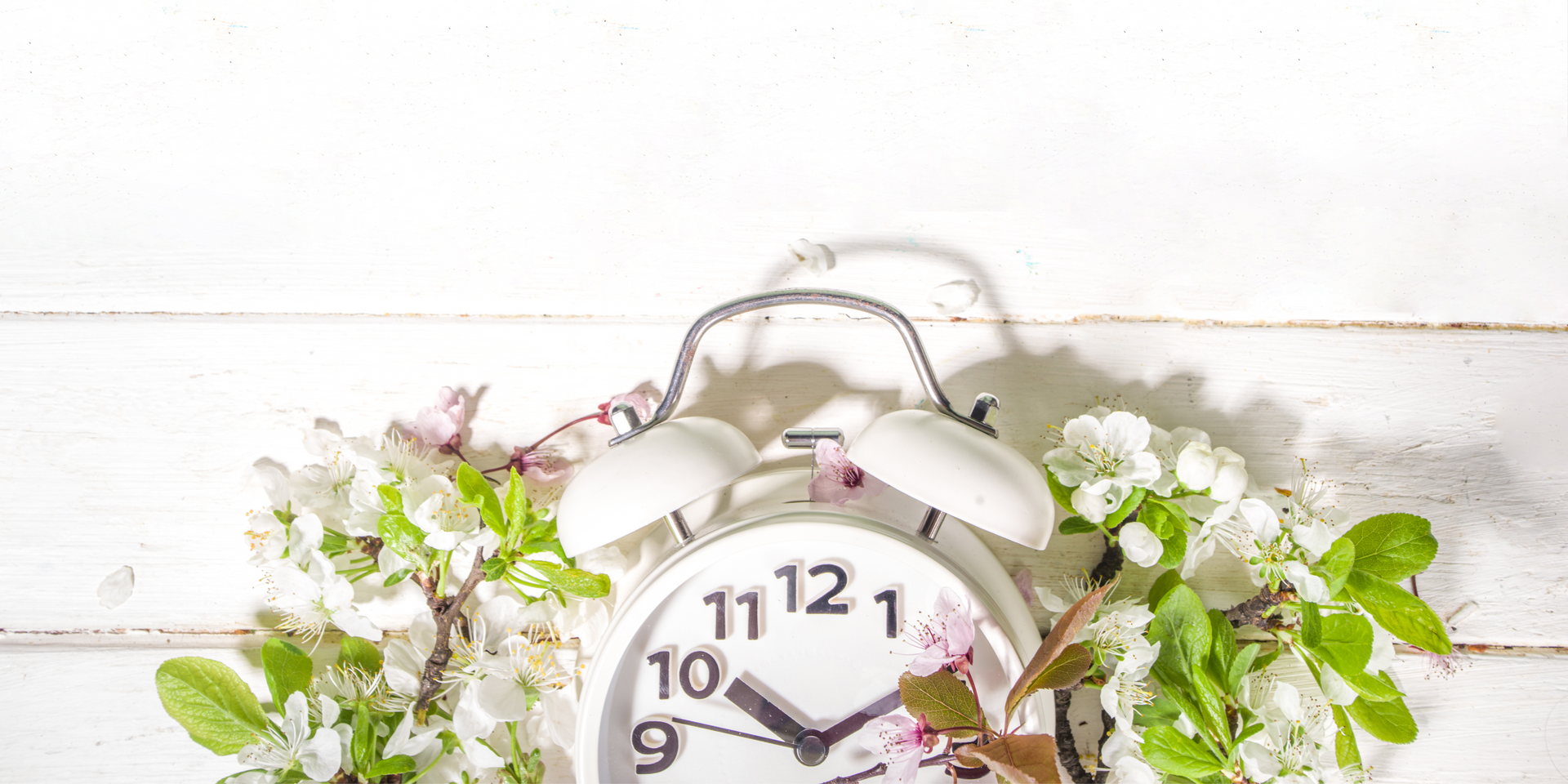
While springing forward is not quite as disruptive as falling back on the clock, it can leave your little ones feeling “off” for a few days. Don’t panic! Even the most sensitive children can adjust. Her e are some tips to help your family prepare and adjust to any time change: An overtired child has a harder time adjusting and coping with any change. Make a special effort in the days approaching the time shift to ensure that your child gets adequate sleep . When the clocks change in either direction, be sure to head outside with your baby first thing in the morning or at least open the curtains and let in the natural light. Early morning exposure to natural light helps to set/reset your child’s internal clock and adjust to the change. Aim for 30 minutes of sunlight each morning for about a week following the change. Also be sure to “put the house to sleep” by dimming lights and activity about 30-60 minutes before the goal sleep time to prepare their brain and body to fall asleep earlier. There are a few ways to approach springing forward. You can decide which to use based on how the current schedule is working for you and on your child’s level of sensitivity to differences in timing. Option 1: Do Nothing (Great for Early Risers!...And Very Young Babies) If your older baby or child is waking too early and this is leading to a schedule that is less than ideal, this is the time change for you! You can use the later morning wake time to shift nap(s) and bedtime to the later timing you’ve always wanted. For example if the schedule prior to the time change was wake at 5:30 am, nap at 11:30 am, and bedtime at 6:30 pm, it would now look like wake at 6:30 am, nap at 12:30 pm and bedtime at 7:30 pm. The span of awake times between sleep remains the same so your child won't likely notice the difference. Voila! For young babies who are not yet on a set clock schedule (under 4-6 months of age) and, instead, need to sleep every 60, 75 or 90 minutes, simply follow that pattern and act as if nothing has changed. Option 2: Jump to the New Clock (Ideal for Adaptable Kiddos) If the current schedule is working for you and your child, your goal is to get back to those clock times – but on the new clock- as quickly as possible. This requires waking your child at their typical wake time on Sunday morning and offering meals, naps, routines and bedtime at the same times on the new clock as you were before. Keep in mind, however, that everything will feel a full hour earlier to your child (because it is!) so there is a potential for a bit of a struggle falling asleep. For example, if bedtime is usually 7 pm you would put baby down at 7 pm on the new clock but it may feel like 6 pm to them. As a result, they may not fall asleep as quickly or easily. You may need to be a bit more flexible and offer some extra support at bedtime but with this method they should adjust rather quickly – typically within a few days to a week. Be choosy about how much support you offer (if any) and how long you offer it. Meaning, avoid old habits that have been eliminated such as fully assisting to sleep in favor of lesser interventions such as checking on baby briefly at intervals. If you know your child is prone to unpleasant behaviors when they are under tired (i.e. coming out of bed a bajillion times at bedtime!) you may want to consider shifting their schedule in advance. Option 3: Prepare 4 or More Days in Advance (Ideal for Very Sensitive Kiddos, Not Usually Necessary) If your baby tends to be more sensitive to shifts in timing, you may want to prepare for the change by gradually shifting their schedule in advance. This approach spreads the hour difference over at least four days which, in our experience is not usually necessary for the spring change. For example, starting on Thursday morning wake baby 15 minutes earlier than usual* to start the day. Then offer meals, naps, and bedtime 15 minutes earlier as well. On Friday wake baby 15 minutes earlier than you did on Thursday (30 minutes earlier than usual) and repeat this process on Saturday and Sunday. For a baby who generally sleeps from 7:30 pm-7 am and naps at 9am and 1pm, for example, you would wake at 6:45 on Thursday morning, move naps earlier to 8:45 and 12:45 and put them to bed at 7:15. Then on Friday wake them at 6:30 and put them to bed at 7:00. On Saturday wake them at 6:15 and put them to bed at 6:45. By Sunday when you wake them at 6 am it will read 7 am on the new clock and you will be back to their usual clock schedule, without it feeling a full hour early. Wednesday: Wake 7:00am, Naps 9:00am & 1:00pm, Bedtime 7:30pm Thursday: Wake 6:45am, Naps 8:45am & 12:45pm, Bedtime 7:15pm Friday: Wake 6:30am, Naps 8:30am & 12:30pm, Bedtime 7:00pm Saturday: Wake 6:15am, Naps 8:15am & 12:15pm, Bedtime 6:45pm Sunday: Wake 7:00am (on the new clock), Naps 9:00am & 1:00pm (on the new clock), Bedtime 7:30pm (on the new clock) If you are unable to shift the schedule in advance, or want to spread it over two days rather than four, use the split the difference option. Option 4: Split the Difference (The Most Realistic Option for Many) If all that advanced shifting and waking seems unnecessary or feels too complicated but a one hour jump feels like too much, then you may fall into the camp of splitting the difference and taking just two days to catch up to the new clock. For example, let's say baby usually wakes at 7am, naps at 9am & 1pm and goes to bed at 7:30pm. To spread the hour change over just two days, wake them at 7:30am on Sunday and put them down for their nap 30 minutes later than usual* at 9:30. They will be only 30 minutes under tired rather than the full 60. Do the same with all other meals and sleep periods throughout the day. Then the following day shift 30 minutes more so everything is happening at their typical times on the new clock. Or, for a non-napping child whose bedtime is 8 pm, you could put them down at 8:30 which will feel like 7:30 to them. Then the following day, shift 30 minutes again landing back at an 8 pm bedtime on the new clock. Sunday: Wake 7:30am, Naps 9:30am & 1:30pm, Bedtime 8:00pm Monday: Wake 7:00am, Naps 9:00am & 1:00pm, Bedtime 7:30pm Regardless of your approach, be prepared that the days and nights will feel a little strange to your baby who can’t really understand what is going on. Don’t stress if your child doesn’t adjust quickly. While most adjust within a few days, some can take a few weeks to fully adjust! And remember that springing forward can mean daylight at bedtime and much earlier in the morning which can interfere with your child’s ability to fall or stay asleep. Don’t fall into the trap of shifting bedtime later waiting for it to grow dark or of letting baby start the day as soon as the sun comes up. Instead, consider purchasing room darkening shades or blackout curtains to keep your little one on track. If all else fails remember that Spring is coming. Sunshine and fresh air make parenting feel SO much better :) Need support for this or any sleep struggle? Our team is here to help! *It is important to note that, if you are shifting the schedule in advance of this change, you are shifting the schedule incrementally earlier. However, if you are shifting after the clocks have already changed, you are shifting incrementally later. **As Amazon Affiliates we may earn from qualifying purchases**
